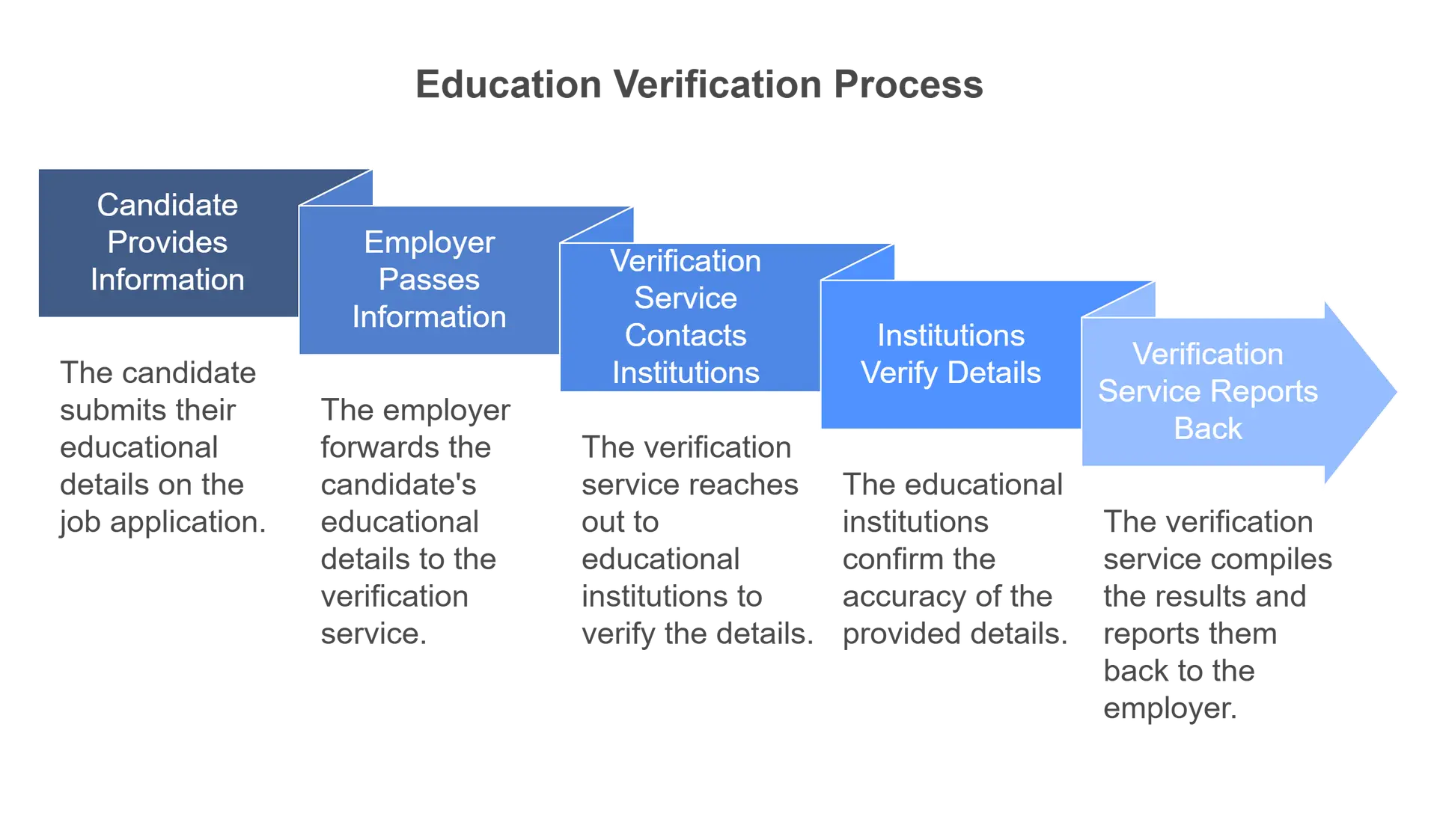Background checks are now a staple in the hiring process. Employers want to ensure they hire the right people. A vital part of this process is education verification. Yes, high school diplomas typically appear on background checks, but what is revealed can vary. Let’s dive into the details.
Imagine you're about to apply for your dream job. You've polished your resume, perfected your cover letter, and are ready to shine in your interview. Then, a nagging worry hits you: "Will my old high school record affect my chances?" Background checks are becoming more common, and understanding what they reveal can ease your worries.
Key Takeaways
- High school diplomas can be verified during background checks to confirm educational qualifications.
- Verification typically includes school name, attendance dates, and graduation confirmation.
- Details like grades and coursework are not usually disclosed.
- Employers verify education to ensure candidates meet job requirements and provide accurate information.
- Honesty about educational background is crucial to avoid trust issues during hiring.
What is an Education Verification?
Education verification is part of background checks where employers confirm the educational qualifications you list. This helps them ensure that the information you provide is accurate and truthful. Employers usually use third-party services for this task.
These third-party services specialize in verifying the educational background of candidates. They reach out to schools and academic institutions to confirm your credentials. This process is crucial for employers to trust that you have the education you claim. Education verification helps maintain the integrity of the hiring process and ensures only qualified candidates move forward.
EXPERT INSIGHT: For HR professionals like us, the background check process is an opportunity to build trust and ensure transparency in the hiring process. Verifying an educational background is about confirming the basics: Did they graduate? Did they earn the qualifications they claim? Identifying what's true and what's not helps both candidates and employers navigate this process with transparency and confidence. Honesty and open communication are essential. Ultimately, we can filter the candidates we want to hire—not only those who are technically qualified, but also those who are trustworthy and inclined to contribute to the organization's success. - Charm Paz, CHRP
Common Types of Education Checks
- High school diploma/GED verification: Confirm if you have graduated from high school or obtained a GED.
- College degree verification: Verifies if you have completed higher education.
- Professional license verification: Checks for any professional certifications or licenses.
How Education Verification Works
Employers use third-party services to conduct education verification. These services contact schools or educational institutions to verify records. This process ensures the credentials you claim to have are genuine.
The verification process involves multiple steps. First, you provide the necessary information about your education on your job application or resume. Then, the employer passes this information to the third-party service. The service contacts the educational institutions to verify the details provided. Finally, the service reports back to the employer with the verification results.

What Information About High School Diplomas Do Background Checks Show?
Background checks generally show specific details about your high school education. These details help employers verify your educational background and ensure you meet their requirements.
Core Information
- Name of the high school attended: Verify the institution from which you graduated.
- Dates of attendance: Confirm the period you were in school.
- Confirmation of graduation (diploma awarded): Proves you completed high school.
This core information is crucial for employers to verify your educational qualifications. It helps them ensure you have the primary education required for the job.
What's Typically NOT Shown
- Grades (GPA): Employers usually don’t see your grades.
- Specific coursework: The courses you took aren’t included.
- Disciplinary records (unless very serious): Minor infractions aren’t reported.
Employers are more interested in whether you graduated rather than your specific grades or coursework. Disciplinary records are usually not part of the verification unless they involve serious issues.
Sometimes, discrepancies can occur, such as if your name changes or your school records are outdated. It’s always good to double-check your records before applying for jobs. If there are any discrepancies, it's best to address them proactively.
Why Do Employers Check High School Diplomas?
Employers check high school diplomas for several reasons. Understanding these reasons can help you understand why education verification is essential to hiring.
Basic Qualification
Many jobs require a high school diploma as an essential qualification. It’s a standard way to ensure candidates meet the minimum educational requirements.
Having a diploma demonstrates that you have completed a basic level of education. This is often necessary for entry-level positions requiring specific skills or knowledge.
Verifying Information
Employers want to ensure applicants are truthful about their education. This helps them trust that you have the knowledge and skills you claim to have.
By verifying your educational background, employers can avoid hiring individuals who might have falsified their qualifications. This verification process helps maintain the integrity of the hiring process.
Limited Relevance
In many cases, especially for experienced candidates, skills and work experience weigh more than a high school record. But for entry-level positions, having a diploma is crucial.
For some positions, the diploma itself might be less important than the fact that you completed your education. However, verifying your diploma is necessary for jobs requiring specific skills or knowledge.
How Far Back Do Background Checks Go for High School?
Background checks don’t have a specific time limit. They usually focus on recent history, typically within the last 10 years. However, some industries with strict regulations may go back further.
Employers are more interested in your recent educational and work history for most jobs. However, background checks might cover a more extended period in finance or healthcare.
It’s important to note that some states have "Ban the Box" laws that limit inquiries into criminal history during the early stages of the hiring process. These laws aim to give candidates a fair chance by removing questions about criminal history from job applications. While these laws primarily focus on criminal records, they also influence how background checks are conducted.

Can You Get Hired Without a High School Diploma?
It Depends on the Job and Industry
Some fields, like technology or the arts, may value experience over formal education. Others, especially those requiring specific certifications, might not.
For instance, jobs in creative fields or specific technical roles might prioritize your portfolio or experience over formal education. However, healthcare, education, or finance jobs might require specific educational qualifications.
GED as an Alternative
A GED (General Educational Development) certificate can be a suitable alternative to a high school diploma. It shows you've met high school-level academic skills.
A GED certificate can open doors to many job opportunities requiring a high school diploma. It demonstrates your commitment to completing your education.
Tips for Job Seekers Without Diplomas
- Focus on relevant skills and experience: Highlight what makes you a strong candidate.
- Network effectively: Use connections to find job opportunities.
- Highlight any additional training or certifications: Show you’ve continued your education in other ways.
You can improve your chances of getting hired by focusing on your strengths and showcasing your skills and experience. Networking can also help you find job opportunities that match your qualifications.
Concerns and Misconceptions About High School Diplomas on Background Checks
Common Worries
- "Will a bad GPA hurt me?" No, employers typically don’t see your GPA.
- "What if I didn’t graduate?" Be honest about it and focus on your skills and experience.
- "Can they see if I got in trouble?" Usually, minor disciplinary records are not shown.
These everyday worries often stem from misunderstandings about what background checks reveal. Employers are more interested in verifying your graduation status than your grades or minor infractions.

Debunking Myths
Background checks are thorough, but they don’t show everything. They focus on verifying the qualifications you claim. Understanding what is and is omitted can help ease your worries.
Myths about background checks being all-encompassing can create unnecessary anxiety. Knowing the facts can help you feel more confident during the job application process.
Conclusion
In summary, while high school diplomas appear on background checks, the information is often limited to essential details. Employers are more interested in your honesty and the skills you bring. Be transparent with potential employers, and focus on showcasing your strengths.
Honesty and transparency are essential when it comes to background checks. By understanding what information is revealed and preparing accordingly, you can confidently approach the hiring process.
About GCheck
GCheck’s services empower businesses to build better teams by ensuring accurate, timely, and compliant background checks. Our commitment to innovation, customization, and compliance sets us apart as a trusted partner in talent acquisition.
- Criminal Background Checks: Ensure workplace safety by checking candidates' criminal history at all levels. Fast and compliant.
- Employment Verification: Quickly confirm job history to ensure candidates are honest and reliable.
- Education Verification: Verify degrees and certifications to ensure candidates’ qualifications are genuine.
- Drug Testing: Promote a safe, drug-free workplace with customizable testing options.
- MVR Driving Record Checks: Check driving records to ensure safety and compliance for driver roles.
- People Searches: Access accurate, nationwide data for complete candidate vetting.

